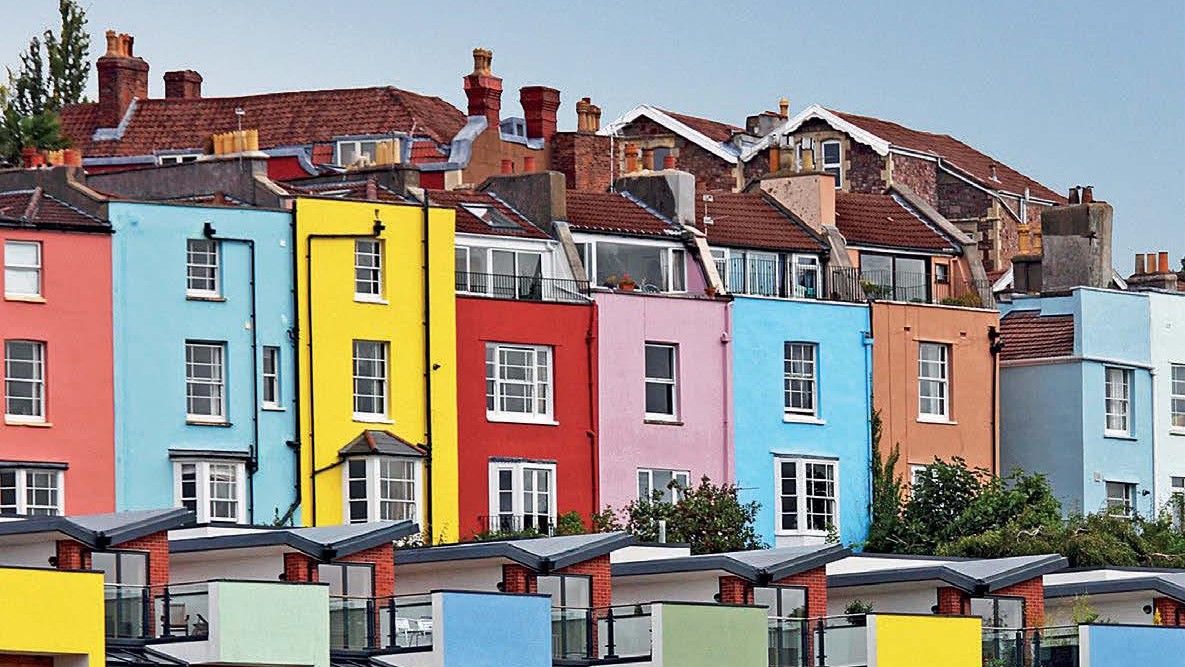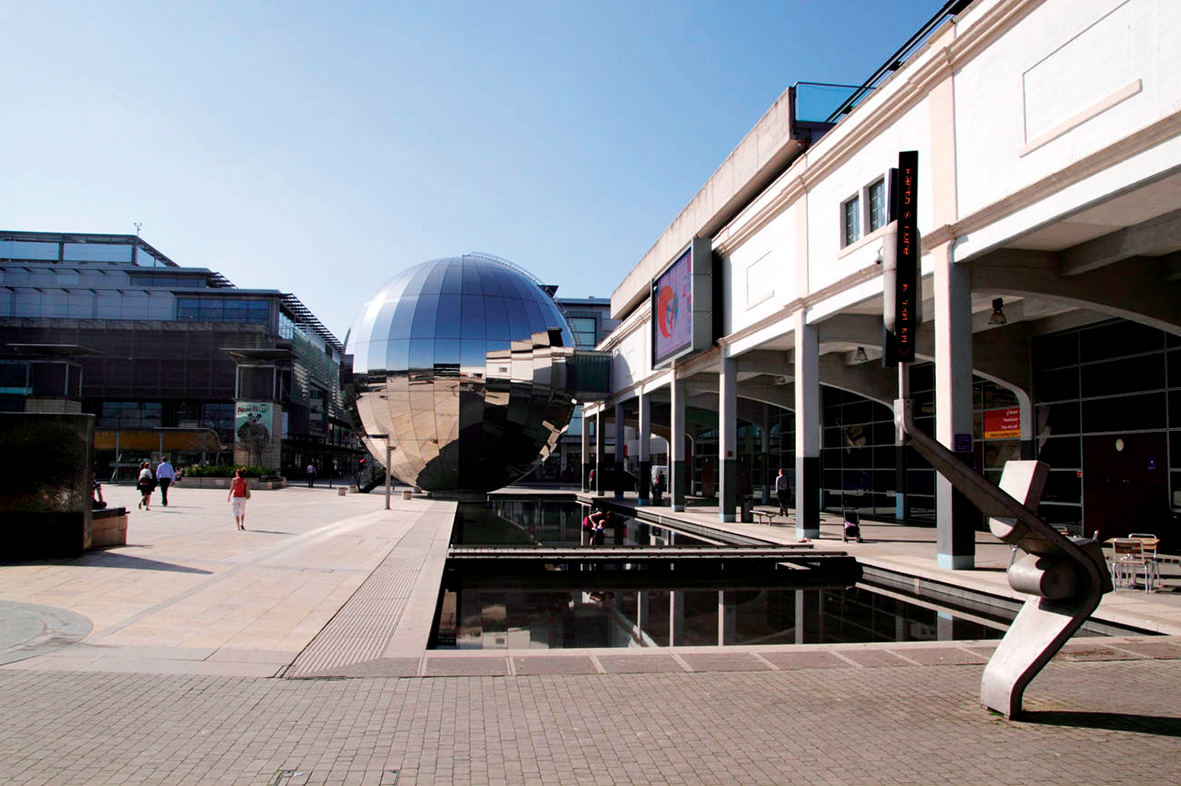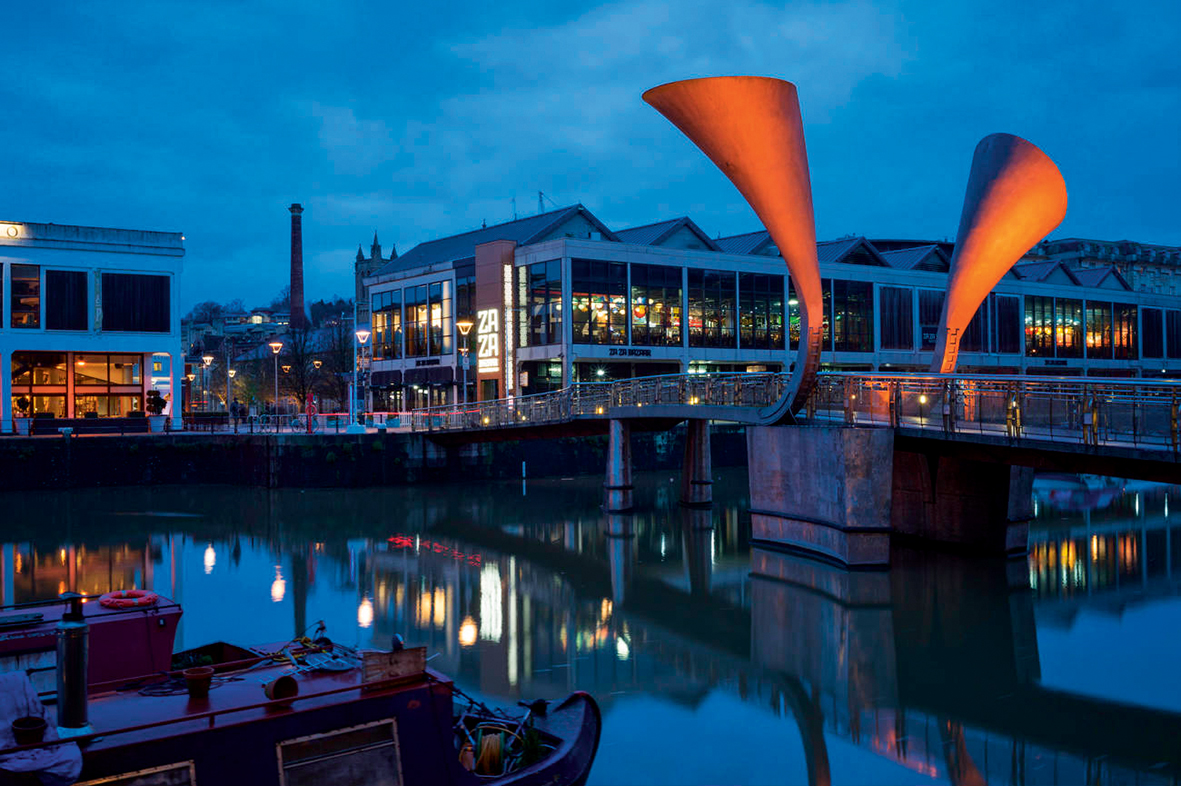
Images © Alamy
Bristol's waterways claimed the lives of 31 people between 2012 and 2017. A quarter of the accidental deaths took place on the city's harbourside, where revellers often emerge drunk from nightclubs and bars in the early hours.
In an effort to prevent further casualties, the city council worked with the University of Bristol on an innovative test pilot to install heat-sensitive cameras along the waterfront that detect if a person has fallen in. The perimeter system exploits a highly advanced 5G test network, the first of its kind in Europe, to capture high resolution images and record changes to water temperature that might indicate the presence of a person. If anything unusual is spotted, an alert is triggered to emergency services. Two lives have been saved using the cameras in the six months since they were installed, prompting other university cities to consider similar deployments.
The cameras are among a range of intelligent systems being rolled out in Bristol as part of a drive to become an "open, programmable city", able to provide better services and improve citizens' quality of life.
Bristol was chosen as Britain's smartest city in the UK Smart Cities Index, published by Huawei and Navigant Consulting in October 2017, based on its pioneering approach to open data, energy innovation and community engagement.
Key initiatives include a high-speed fibre optic network that connects smart traffic lights and police and emergency services to improve response times and safety. The city's big data is available on a free, opendata website and analysed and visualised on a giant screen in a converted planetarium. A commitment to cut emissions by 40% by 2040 led the council to set up its own energy company and pump significant investment into renewable power. And "citizen sensing" projects have highlighted the benefits and drawbacks of data and sparked the development of new apps.
After a four-year pilot phase, many experiments are starting to make the transition to real-world projects, while authorities and researchers grapple with challenges related to economic viability, data privacy and interoperability.
Eric Woods, Navigant's research director and author of the Smart City Index, told Modus: "There is a swathe of innovations in Bristol and a push on several levels. The city is making the bridge into scalable solutions that have a measurable impact, which shows that this initiative isn't out on a limb, as in other cities where a pilot or a project isn't tied into a broader strategy."
Data gateway
Global interest in smart cities is being driven by factors such as urbanisation and population growth, the need to reduce emissions, better manage resource consumption, and respond to economic, financial, and environmental pressures. The roll-out of powerful communications infrastructure, internet of things (IoT) technologies and related sensors and connectivity are enriching the data available to cities to manage these factors.
Bristol's powerful data capability is underpinned by a fibre optic test network that functions as a springboard for IoT sensors mounted on 2,400 smart street lamps and a city-wide wireless zone.
Julie Snell, CEO of Bristol is Open, a joint venture between the University of Bristol and Bristol City Council set up to run the testbed, explains: "We're unique among cities in that the council had its own network of underground ducting from an old cable TV network, which removed significant infrastructure installation costs related to digging up roads to install services." The network is closed and secure and exploits "massive computing power" to enable suppliers to trial new products and services without the risk of causing disruption or suffering data breaches.
Huawei was particularly impressed by a Smart City Operations Centre that connects with the council's Emergency Control Centre, Traffic Control Centre and Community Safety Control rooms, plus services for telecare, alarm and security monitoring and lone-worker support. The ultimate aim is to create a single place to monitor and control city functions. However, such tight data integration requires strict protocols around data sharing and security – a topic that Huawei itself has been forced to confront following concerns raised by the UK and US over its planned roll-out of 5G.
Cities generate huge amounts of data, but limiting the number of people able to access it necessarily limits the number of problems to which it can be applied. The council's Open Data Bristol website allows businesses and developers to access and export stats ranging from council salaries, to ethnic diversity and obesity for use in applications or research. Immersive visualisations of real-time sensor data are displayed in the city's former planetarium, which has been rebranded as the "Data Dome", and used for purposes such as public consultations.
Data can be transformative, but some insights could be lost as a result of the EU's tighter data protection and privacy laws. Snell warns: "GDPR is making it very difficult for us to do this. We can't be as creative as we have been in the past because we're having to spend as much time on the social and legal science as we are on the technology. It's slowing down development, but rightly so. Taking cities towards a 'big brother' scenario would be wrong."


Energy leaps
Bristol was European Green Capital in 2015, and it wants to become carbon neutral by 2050. The council set up its own energy company, Bristol Energy, in 2015, and was the first UK local authority to develop its own wind farm, with two turbines running at Avonmouth. Carbon-cutting installations have included energy-efficient street lighting, biomass boilers and 8MW of solar panels on or around council-owned buildings. A heat network of underground pipes is being installed in central Bristol to provide low-carbon heat and energy, and there are plans to expand it to other areas.
The Bristol Community Energy Fund was established, with seed-funding from the Department of Energy and Climate Change, to offer grants and loans to support the development of community energy efficiency and renewable energy projects. So far, 39 projects have benefitted.
It's inspiring stuff, but not all sustainable ambitions have gone to plan. Even though subscribers are increasing, Bristol Energy posted a £11.2m loss for the last financial year, despite receiving an estimated £27m in local authority funding since it launched.
The council is now looking for partners to fund City Leap, a programme that aims to generate £1bn to invest in sustainable energy infrastructure over the next decade. Around £300m will be directed towards energy efficiency measures needed to help households cut energy bills and reduce fuel poverty. A first-of-its-kind battery energy storage system will be developed to connect the city's energy network with local and national transmission systems.
The programme raises significant data collation challenges, says Snell. "Think about the data generated by the vast amount of technology and infrastructure, including the heat network, renewables, and perhaps batteries in electric cars and homes feeding back into the grid. We need to work out how to make those multiple sources of data interoperate."
Dweller dynamics
Community engagement is recognised as an inclusive and effective method of smart city building. Bristol is one of three cities – along with Florence and San Sebastian – participating in the European Replicate project set up to explore how "citizen sensing" can enhance lives in areas of energy and air-quality management, increased engagement, and more. The objective is to develop projects that can be replicated in other cities.
Citizen sensing projects encourage people to build, use, or act as sensors to tackle issues that are important to them. Those in Bristol are being spearheaded by arts organisation Knowle West Media Centre (KWMC), which has worked with locals to develop applications to tackle food waste, air pollution and mental health issues. A "Damp Busters" project helped citizens develop a sensor installed in rented accommodation that monitors damp and humidity levels to help residents and the council better manage the risks. One playful upcoming project will explore an observed gender bias in AI through the development of a feminist chatbot.
According to Carolyn Hassan, director of KWMC, engaging local people in the design process helps make products more fit for purpose. It is also vital for gauging citizens' understanding of, and attitudes to, data. "Data is not the most interesting subject for ordinary people, so we need to look at how we increase data literacy skills, particularly among young people, and engage them with big and small data," she says.
Bristol's economy is forecast to grow by 2.3% in 2019, but this prosperity is not enjoyed by everyone. People in the most affluent areas of the city can, on average, expect to live almost 10 years longer than those in the poorest areas. Bristol Is Open believes that new technology can help redress the balance, and has secured funding to extend its fibre optic network into more deprived areas of the city. Faster digital connectivity is expected to improve education in schools with poor broadband, and potentially address health problems related to the growing ageing population.
"The digital divide is widening because telecoms companies can't afford to move into more deprived areas where their business case doesn't stand up," says Snell. "We want to use the network as a platform to find other business models and other ways of connecting with people to prove to the industry that there is a business case to get out and support these people."
As cities such as Bristol ride the wave of technological progress, and embrace applications for sensors, connected cars, next-generation communication and AI, such strategic thinking will be critical to inform decision-making that delivers long-term social and economic benefits.
"We need to look at how we can data literacy skills, particularly amongst young people, and engage them with big and small data" Carolyn Hassan, KWMC
